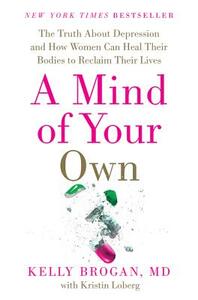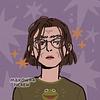Take a photo of a barcode or cover
Definitely makes me hesitant to recommend anti-depressants. The author reinforces the idea that taking care of your gut is so important to your overall health, including mental health.
Her overall message--that being healthy is the best defense and our lifestyles are making us sick--is sound. Diet, meditation, exercise, sleep: yes. Anti-gluten, anti-vax? No. Those have proven to be dangerous mumbo jumbo. Still, some things to take away from reading.
informative
slow-paced
It's important to know my context before sharing why my true rating is ~3/5 stars.
I came to Kelly's work via a podcast interview in 2023, and I had to hear her speak more. At that point, I'd already had big transformations in how I view health paradigms, over a decade of healing IBS through lifestyle changes (not being helped by the medical system), then underwent a 5-year dark-night-of-the-soul spiritual journey (atheist to deeply spiritual), during which I learned the importance of the body, somatics, trauma (from teacher Irene Lyon, highly recommend). I stopped resonating with the term "mental illness" on my own, when I learned all about the nervous system and felt in my body how stored survival stress transforms as it's healed, resolving symptoms previously classified as mental illness.
Anyway, I was drawn to someone who also pursues Truth, and allows herself to become and change as new information is received and transformation happens. (She references a lot that 'I used to be an activist, for about 10 years I was fighting Big Pharma & medical-agricultural-industrial complex.' but since stepping out of that victim triangle, that's no longer where she directs her energy. So much nuance and context needed here -- check out her interviews if interested.) I'd probably listened to over 40 hours of Kelly speaking in interviews and on her own podcast during the year. She is articulate and nuanced, embodied, willing to be wrong, courageous to look at her shadow parts, etc.
I knew she'd written some books, and this is the first one that I've read. As a huge fan of Kelly's work, the book fell short for me. Honestly, if someone were interested in exploring this topic, I would send them to this single interview she did with Teal Swan over this book: https://podcasts.apple.com/us/podcast/61-the-truth-about-mental-illness-with-teal-swan/id1663947298?i=1000655534670
How did the book fall short? I wish she had begun with her personal story! All the time and money and energy at medical school and practicing, only to be stunned at its shortcomings when she was diagnosed with an autoimmune disease. If you haven't been through such a paradigm shift experientially, where the floor crumbles, where you begin to question everything you thought you'd known, where you begin to take responsibility and learn the power we each hold -- it's a big jump. It happens too quickly in the book, and she only shares the story many chapters in.
I imagine if I had read this 10, 15 years ago. The statements are too punchy and bold. Too fast. Too many references to studies (lots of ppl don't understand why/how there are so many studies that have conflicting conclusions, the $$ behind it, how data can be manipulated, etc.). I would have included much more of her personal story, and more client stories... have an arc that shows how we've been duped and. I've been much more moved by seeing folks go through the tedious moments of a paradigm-shift, sometimes taking 10-15 years until it all clicks. (Like in Sarah Ramey's phenomenal memoir "The Lady's Handbook for Her Mysterious Illness," which I highly recommend to all humans!)
I'm grateful to have the added context, knowing that Kelly wrote this book as a very different person, in a different context, with different lenses than who she is today. I'm very curious to read Kelly's two more recent books, to see how the tone changes as she writes with different folks and with different lenses. She's a phenomenal speaker, though; go listen to her on podcasts if you want to dip into these topics.
I came to Kelly's work via a podcast interview in 2023, and I had to hear her speak more. At that point, I'd already had big transformations in how I view health paradigms, over a decade of healing IBS through lifestyle changes (not being helped by the medical system), then underwent a 5-year dark-night-of-the-soul spiritual journey (atheist to deeply spiritual), during which I learned the importance of the body, somatics, trauma (from teacher Irene Lyon, highly recommend). I stopped resonating with the term "mental illness" on my own, when I learned all about the nervous system and felt in my body how stored survival stress transforms as it's healed, resolving symptoms previously classified as mental illness.
Anyway, I was drawn to someone who also pursues Truth, and allows herself to become and change as new information is received and transformation happens. (She references a lot that 'I used to be an activist, for about 10 years I was fighting Big Pharma & medical-agricultural-industrial complex.' but since stepping out of that victim triangle, that's no longer where she directs her energy. So much nuance and context needed here -- check out her interviews if interested.) I'd probably listened to over 40 hours of Kelly speaking in interviews and on her own podcast during the year. She is articulate and nuanced, embodied, willing to be wrong, courageous to look at her shadow parts, etc.
I knew she'd written some books, and this is the first one that I've read. As a huge fan of Kelly's work, the book fell short for me. Honestly, if someone were interested in exploring this topic, I would send them to this single interview she did with Teal Swan over this book: https://podcasts.apple.com/us/podcast/61-the-truth-about-mental-illness-with-teal-swan/id1663947298?i=1000655534670
How did the book fall short? I wish she had begun with her personal story! All the time and money and energy at medical school and practicing, only to be stunned at its shortcomings when she was diagnosed with an autoimmune disease. If you haven't been through such a paradigm shift experientially, where the floor crumbles, where you begin to question everything you thought you'd known, where you begin to take responsibility and learn the power we each hold -- it's a big jump. It happens too quickly in the book, and she only shares the story many chapters in.
I imagine if I had read this 10, 15 years ago. The statements are too punchy and bold. Too fast. Too many references to studies (lots of ppl don't understand why/how there are so many studies that have conflicting conclusions, the $$ behind it, how data can be manipulated, etc.). I would have included much more of her personal story, and more client stories... have an arc that shows how we've been duped and. I've been much more moved by seeing folks go through the tedious moments of a paradigm-shift, sometimes taking 10-15 years until it all clicks. (Like in Sarah Ramey's phenomenal memoir "The Lady's Handbook for Her Mysterious Illness," which I highly recommend to all humans!)
I'm grateful to have the added context, knowing that Kelly wrote this book as a very different person, in a different context, with different lenses than who she is today. I'm very curious to read Kelly's two more recent books, to see how the tone changes as she writes with different folks and with different lenses. She's a phenomenal speaker, though; go listen to her on podcasts if you want to dip into these topics.
I had to stop reading this when the author began to talk about the vaccine-autism “research,” which has been so profoundly blown out of the water that I don’t even know why I am wasting time typing these words. She opens the book by bashing the medical establishment with some shaky research and op-ed pieces not to mention meaningless anecdotes, then spends the rest of the book essentially making herself THE arbiter of all things mental and physical health, citing the very medical establishment she vilifies, when it suits her. Wow, who knew that you could be a gastroenterologist, microbiologist, psychiatrist, and natural healer all in one? She manages somehow to simultaneously shit on, and take pretty big clinical pearls from, the medical establishment. So much contradiction here.
The author has some good points – – get good sleep, eat healthy whole foods, exercise, meditate, and know that we have been misled it comes to psychiatric medications. But the fact that this is her magic bullet to depression? Unbelievable. Or the fact that she thinks that this advice is somehow original? OK, Kelly. Worst of all, this book caters to upper middle-class women and seems to exclude the millions of women who have depression related to and or stemming from traumatic experiences. I gladly invite her to “cure” (and she does say that she can “completely” cure depression) my clients who have PTSD with turmeric because of its “anti-inflammatory properties.“ She makes wildly hyperbolic claims. Great idea to encourage some of my low income clients, who don’t have a decent grocery store within 20 miles of their homes, to pick up some kombucha to “fix their micro biomes.” GTFO.
We always need to be questioning what we are reading and hearing, remain open to new ideas, practices, and critiques of current practices. However this author has gone off the deep end. You know the reputations that many psychiatrists get (despite the fact that most are incredibly conscientious)? It’s people like her that give them these reputations as people who are crazy themselves.
Lastly, the self-aggrandizement is ENDLESSLY nauseating.
The author has some good points – – get good sleep, eat healthy whole foods, exercise, meditate, and know that we have been misled it comes to psychiatric medications. But the fact that this is her magic bullet to depression? Unbelievable. Or the fact that she thinks that this advice is somehow original? OK, Kelly. Worst of all, this book caters to upper middle-class women and seems to exclude the millions of women who have depression related to and or stemming from traumatic experiences. I gladly invite her to “cure” (and she does say that she can “completely” cure depression) my clients who have PTSD with turmeric because of its “anti-inflammatory properties.“ She makes wildly hyperbolic claims. Great idea to encourage some of my low income clients, who don’t have a decent grocery store within 20 miles of their homes, to pick up some kombucha to “fix their micro biomes.” GTFO.
We always need to be questioning what we are reading and hearing, remain open to new ideas, practices, and critiques of current practices. However this author has gone off the deep end. You know the reputations that many psychiatrists get (despite the fact that most are incredibly conscientious)? It’s people like her that give them these reputations as people who are crazy themselves.
Lastly, the self-aggrandizement is ENDLESSLY nauseating.
My psychiatrist at Mass General Hospital recommended this book. A colleague recommended it to her. At my last visit she still hadn’t read it so we couldn’t discuss it. However we have discussed the mind-body connection; that I do not want to be dependent on Klonipin or my current SSRI [I am tapering off Lexapro]; that I believe in homeopathic treatments and see an acupuncturist; that I do yoga and I am a vegan. Going into this book I felt I was doing lots of things right but I still am miserable and low functioning. I don’t take a lot of medications outside my daily psychiatric meds, vitamins and supplements. I listen to my body. I feel fairly connected. My psychiatrist said that there’s a disconnect between my level of education and my level of function. That’s not easy to hear. But I know that it’s likely the truth as I cannot find work and struggle to get paid for anything at which I feel I excel. Writing reviews for example.
This book isn’t without controversy. For one thing Kelly Brogan, MD is an anti-vaxxer. I’ve worked as a healthcare professional and get my flu shot every year and have done so for the past decade or longer. Dr. Brogan believes that mental illness is not a chemical imbalance but a symptom of imbalance in our body. It is NOT a disease. I only recently started thinking that mental illness was a disease and a disability because I attended DBSA meetings and that’s what the majority of people at DBSA and NAMI believe.
full review here: https://entertainmentrealm.com/2016/06/16/book-review-a-mind-of-your-own/
This book isn’t without controversy. For one thing Kelly Brogan, MD is an anti-vaxxer. I’ve worked as a healthcare professional and get my flu shot every year and have done so for the past decade or longer. Dr. Brogan believes that mental illness is not a chemical imbalance but a symptom of imbalance in our body. It is NOT a disease. I only recently started thinking that mental illness was a disease and a disability because I attended DBSA meetings and that’s what the majority of people at DBSA and NAMI believe.
full review here: https://entertainmentrealm.com/2016/06/16/book-review-a-mind-of-your-own/
Some interesting ideas and good suggestions for changing some lifestyle practices, but I’m also highly sceptical of some of her claims. Plus, although pills aren’t ideal, sometimes they ARE NECESSARY. I know some people who have tried everything (including these suggested changes), but nothing works excepts the pills. I really believe that diet changes can help many people, but she has very little appreciation for how different people need different things.
Also, I’m NOT doing a coffee enema. Period.
Also, I’m NOT doing a coffee enema. Period.
There is some great research-based information in this book, but it's quite alienating. Take what works for you, and leave the rest!
Super interesting, somewhat overwhelming. Left me with a lot to think about!
This is one of the worst 'pseudo-science' books I have ever read. She criticises 'Big Pharma' for using studies with small sample sizes and for failing to control for placebo effects -- but then the studies she posts as sources for her truly outrageous claims are so completely flawed it's hard to know where to begin in criticising them.
I was hoping for a book that explained some of the science behind depression, and had some of the studies of the recent links between the microbiome and mental health. What I got was an angry, controversy theorists' rantings about the evils of antidepressants, antibiotics, statins, vaccines and painkillers.
Her healing 'plan' seems to be a version of whole30/paleo, with some meditation and exercise thrown in. Though, disclaimer, I quit this book 40% of the way through because I just couldn't take any more.
I was hoping for a book that explained some of the science behind depression, and had some of the studies of the recent links between the microbiome and mental health. What I got was an angry, controversy theorists' rantings about the evils of antidepressants, antibiotics, statins, vaccines and painkillers.
Her healing 'plan' seems to be a version of whole30/paleo, with some meditation and exercise thrown in. Though, disclaimer, I quit this book 40% of the way through because I just couldn't take any more.




